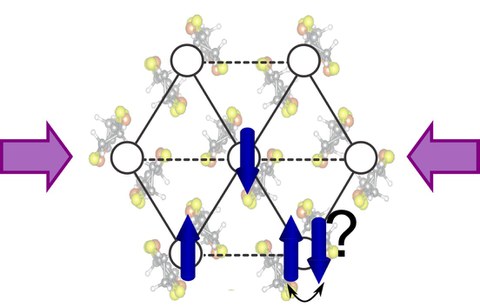Sep 01, 2025
Research: Quantum Magnetism Under Strain: New Method Enables Precise Control of Geometric Frustration

Schematic illustration of the triangular lattice with frustrated spins in the material κ-(ET)₂Cu₂(CN)₃. Controlled anisotropic strain allows tuning of geometric frustration and manipulation of magnetic ordering.
In everyday life, “frustration” refers to the tension between conflicting goals. In quantum physics, a similar situation arises when the electron spins in a material cannot all align in an energetically favorable way due to the geometry of the crystal lattice. A classic example is the triangular lattice, where each spin wants to be antiparallel to its neighbors—an impossible task. This “magnetic frustration” creates a fertile ground for exotic quantum states, such as the elusive quantum spin liquid.
Because frustration is directly linked to the geometry of the crystal lattice, manipulating that geometry offers a promising route for control. This is precisely where the new study comes in: by applying finely tuned directional strain to the lattice, the researchers were able to selectively modify the magnetic interactions within the material. These interactions are highly sensitive to the distance between spins—anisotropic distortions change only certain distances, thereby disturbing the delicate balance of competing interactions. As a result, geometric frustration becomes a controllable parameter rather than a fixed material property.
To capture this tunable frustration experimentally, the team used highly sensitive thermodynamic measurements of the elastocaloric effect—a technique that detects temperature changes under mechanical stress. This allowed them to construct a detailed temperature-strain phase diagram of the organic material κ-(ET)₂Cu₂(CN)₃, which forms a slightly distorted triangular lattice. Remarkably, the diagram spans both the ideal frustrated regime and a less frustrated reference state—offering the first comprehensive experimental map of frustration tuning in such systems.
The study highlights the great potential of lattice engineering—the deliberate modification of crystal structures—as a strategic tool for investigating and controlling novel quantum phases in strongly correlated electron systems.
F. Lieberich, Y. Saito, Y. Agarmani, T. Sasaki, N. Yoneyama, S. M. Winter, M. Lang, E. Gati,
Probing and tuning geometric frustration in an organic quantum magnet via elastocaloric measurements under strain,
Sci. Adv. 11, 33 (2025)
